
This series of six webinars is designed to educate the user on the basics of measurement, calibration, maintenance, experimental design, and theory & applications, as it relates to microcalorimetry. Each webinar is about 60 minutes long, and will have a 10-minute question and answer session at the end. A Certificate of Completion will be awarded to viewers who watch all 6 webinars in this series.
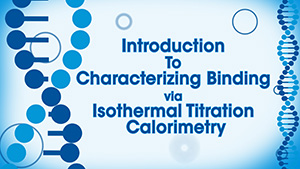
Introduction to Characterizing Binding via Isothermal Titration Calorimetry (ITC)
Episode 1 of our Practical Approach to Microcalorimetry Webinar Series introduces a user to the basic theory of isothermal titration calorimetry (ITC) and experimental design. It also addresses how a user can interpret the thermodynamic values associated with fitting the data.
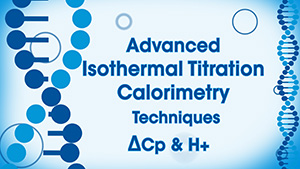
Advanced ITC Techniques ΔCp and H+
Episode 2 of our Practical Approach to Microcalorimetry Webinar discusses two advanced ITC techniques: temperature variation and coupled protonation.
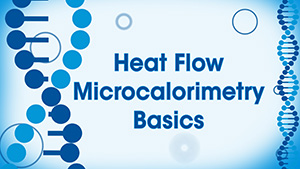
Heat Flow Microcalorimetry Basics
This episode of our Practical Approach to Microcalorimetry Webinar Series introduces Heat Flow microcalorimetry focusing on the TAM instrument.
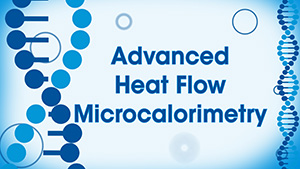
Advanced Heat Flow Microcalorimetry
This episode of our Practical Approach to Microcalorimetry Webinar Series discusses various ways to interact with the sample material when taking heat flow measurements on the TAM instrument.
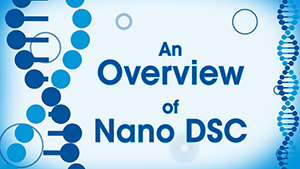
An Overview of Nano DSC
The fifth episode of our Practical Approach to Microcalorimetry Webinar Series introduces Microcalorimetry and the Nano DSC instrument.
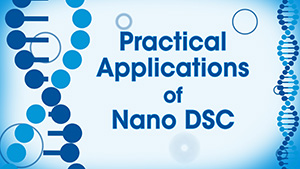
Applications of Nano DSC
This final episode of our Practical Approach to Microcalorimetry Webinar Series discusses various applications utilizing Nano DSC.
About The Speakers
Colette Quinn, Ph.D.
 Colette Quinn received her BA degree in chemistry from Carroll College in Helena, MT. She then began graduate research at Dartmouth College studying toxic metal remediation and essential metal regulation under a Superfund program through the NIEHS, a division of the NIH. The majority of her work was completed using an isothermal titration calorimeter (ITC), which was complimented by a variety of other biophysical techniques. While pursuing her own research, she has also performed ITC contract work for a pharmaceutical company. Shortly after obtaining her Ph.D. in chemistry in 2009, Colette joined TA Instruments as an applications scientist.
Colette Quinn received her BA degree in chemistry from Carroll College in Helena, MT. She then began graduate research at Dartmouth College studying toxic metal remediation and essential metal regulation under a Superfund program through the NIEHS, a division of the NIH. The majority of her work was completed using an isothermal titration calorimeter (ITC), which was complimented by a variety of other biophysical techniques. While pursuing her own research, she has also performed ITC contract work for a pharmaceutical company. Shortly after obtaining her Ph.D. in chemistry in 2009, Colette joined TA Instruments as an applications scientist.
Michael Mathews, Ph.D.
 Dr. Michael Mathews is an application scientist for TA Instruments. Michael received his bachelor’s degree in Chemistry from Western Michigan University in 1992 and his Ph.D. in Biochemistry from the University Of Utah in 2001. Before working at TA Instruments, Michael was the Director of Assay Development for a startup Biotech firm, followed by 5 years at the leading producer of bacteriophage in the US as the Vice President of R&D. He has also taught several courses at the high school, college, and university level around the Salt Lake City, Utah area, where he currently resides.
Dr. Michael Mathews is an application scientist for TA Instruments. Michael received his bachelor’s degree in Chemistry from Western Michigan University in 1992 and his Ph.D. in Biochemistry from the University Of Utah in 2001. Before working at TA Instruments, Michael was the Director of Assay Development for a startup Biotech firm, followed by 5 years at the leading producer of bacteriophage in the US as the Vice President of R&D. He has also taught several courses at the high school, college, and university level around the Salt Lake City, Utah area, where he currently resides.
Paul Vaitiekunas
 Paulius (Paul) Vaitiekunas is an application scientist for TA Instruments. Paul has received his bachelor’s and master’s degrees in Chemistry from Kaunas University of Technology, Lithuania. After moving to the USA, Paul decided to continue his education at The Johns Hopkins University. In 2009, he graduated from The Johns Hopkins University with a master’s degree in Biotechnology, concentration in Molecular Targets and Drug Discovery Technologies. The same year, Paul joined prof. Peter Privalov’s lab at The Johns Hopkins University where he has worked on multiple research projects and managed the lab. Paul joined TA instruments in 2014 and works from TA Instruments headquarters in New Castle, DE.
Paulius (Paul) Vaitiekunas is an application scientist for TA Instruments. Paul has received his bachelor’s and master’s degrees in Chemistry from Kaunas University of Technology, Lithuania. After moving to the USA, Paul decided to continue his education at The Johns Hopkins University. In 2009, he graduated from The Johns Hopkins University with a master’s degree in Biotechnology, concentration in Molecular Targets and Drug Discovery Technologies. The same year, Paul joined prof. Peter Privalov’s lab at The Johns Hopkins University where he has worked on multiple research projects and managed the lab. Paul joined TA instruments in 2014 and works from TA Instruments headquarters in New Castle, DE.

